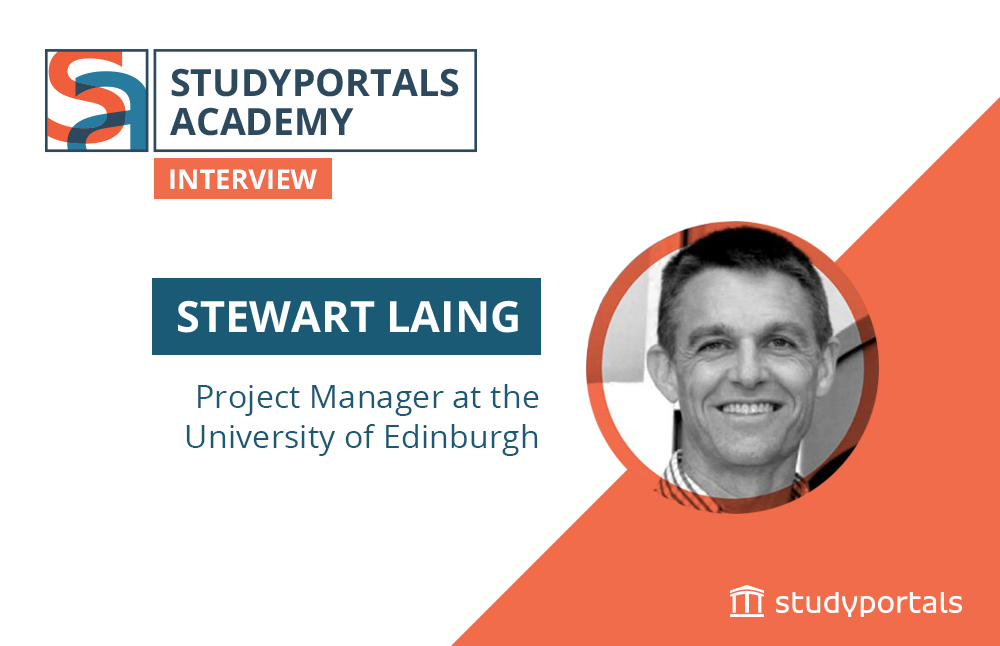Using data with a purpose – interview with Stewart Laing from the University of Edinburgh
‘I never guess. It is a capital mistake to theorize before one has data. Insensibly one begins to twist facts to suit theories, instead of theories to suit facts.’ – Sir Arthur Conan Doyle
Stewart Laing, Project Manager at the University of Edinburgh, has seen first hand what value big data can bring to higher education institutions. Mr Laing, up until recently, has occupied the position of Director of Marketing and Communications at Glasgow Caledonian University and was responsible for increasing international student recruitment by 37% over a two-year period. Currently, he is working with the University of Edinburgh to help develop the strategy for growing the university’s online Master’s programmes.
From a marketing perspective, Mr Laing is convinced that asking the right questions and setting the right goals regarding data is the most challenging and rewarding mindset that universities can adopt. Without consulting and understanding data, one cannot make an informed and strategic decision regarding international student recruitment. We had the pleasure to sit down with Mr Laing and discuss the latest challenges and opportunities that universities have regarding big data and its usage. He will also be presenting at the Studyportals Academy event, happening on 25th-26th of April in Amsterdam, the Netherlands.
Q: For any institution, their marketing activities and big data should be tightly linked together, especially in 2018. That also applies to universities, for example when we think about their efforts to attract international student. How did you introduce data in your marketing strategies?
SL: Data and marketing go hand in hand nowadays. Personally, I’ve always used data in my marketing activities wherever possible. Take, for example, the current projects that I am involved in regarding online courses at the University of Edinburgh. To get a clearer idea of what would work and what wouldn’t in the market, we needed to access different data points. The main challenge was to access data that was truly meaningful and relevant to what we were doing. In our planning, we did have a lot of data points to consider, but that doesn’t mean that all that data is needed. For example, when working with Studyportals, we appreciated the fact that you understood the value of data by connecting it to our needs. When using the right type of information, one can attain their results in a more strategic and efficient manner.
Q: How would you define a “meaningful piece of data” in the context of higher education?
SL: You need to look at this concept on multiple levels. For example, in the case of online courses, understanding the relative supply-demand relation in the market was very useful. That helped us identify specific areas of investment for new programmes. It did facilitate questions like which programme area would offer the most potential. This information was obtained with the help of Studyportals. Of course, we did supplement this specific data set with other data sources, such as looking at the job market, the current and future terms of employment, forecasts for certain areas of speciality etc. But this is one area where big data has cleared out a lot of uncertainty regarding developing new curricula and programmes.
Q: Did the usage of big data also impact the way you plan your student attraction activities?
SL: We are still at an early stage of using the available data at its fullest potential for our marketing activities. But we can already see concrete ways in which this data can help us make better decisions. By understanding what programmes have the most traction, we can then move on to identifying the profile of potential students. Apart from demographic information, what we really want to know more about is the motivation of these prospective students. What makes them want to join a specific online programme? Because of our data, we’ve discovered that the main factor is very much motivated by career enhancement and the requirement to stay in full-time employment. This realization has been at the heart of our understanding of the market. That is currently helping us better apprehend and communicate to our audience about why students should study online, the specific benefits, and the value of studying online. All of this while articulating particularly on why they should choose the University of Edinburgh for their studies.
Q: Because of your data analysis efforts, is there anything specific that helped you better understand your students? Also, if so, how have you incorporated these insights in your international student recruitment strategy?
SL: We have recently completed an initiative to define the personas of our students, which has been very useful for our recruitment strategy. These personas are developed based on psychographics and study motivation. We currently have 6 personas that range across a spectrum starting from being very career driven to being a hobbyist. The majority of our profiles touch upon a more career-focused direction. This makes sense since career and future employment is the single biggest factor in students deciding to study online, especially for their Master’s. We’ve also done some further work to really understand what kind of information we need to provide to students for us to help them through their decision-making process. That is why one of our focus points revolves around developing that targeted content and revisiting that student journey on our website. That will make the student experience much more positive and fruitful for both the student and the university.
Q: How has your messaging changed towards your prospective students because of the usage of big data?
SL: This slight shift in our messaging and tone is still under planning. But we do see the need to optimise in order to reach relevant results in terms of enrolments and overall reputation. Traditionally, the approach for universities has been much more focused around the university structure itself. In 2018, we need to be much more student-focused, thinking of how the student understands the available information around online learning. We want to make it easier for students to find information. At the same time, we plan on increasing the quality of that available information. By supplying richer content with more engaging and persuasive value, we can make a clearer point to our prospective students on the value of studying online and on choosing the University of Edinburgh for doing that.
Q: Your session at Studyportals Academy touches on the topic of using data in public and private higher education institutions. Have you noticed any difference between using data in public higher education institutions compared to the private ones?
SL: It is an interesting topic to dive in. To answer this question, we need to understand how these different institutions approach international student recruitment. Private institutions have a tendency to be more commercially aware and savvy. This makes sense because of their income source. They treat student recruitment from a more business-related point of view. Therefore, they are more likely to invest in such areas as big data, that will support their initial goal of getting more quality students enrolled in their programmes.
I think the challenge in a lot of public institutions is that they don’t see the value of marketing in its broader sense, not just from a promotional perspective. The money that many of them spend is kept to a minimum as well. Their split-up into different campuses and schools also contributes to public universities not feeling ready to invest in big data (at least in the beginning). It becomes a harder sell because they are fragmented also in their approach to the marketplace. But here is where the challenge lies, because as Sir Arthur Conan Doyle, a University of Edinburgh alumnus, said, “I never guess. It is a capital mistake to theorize before one has data. Insensibly one begins to twist facts to suit theories, instead of theories to suit facts.” Data is becoming more relevant in our world nowadays.
Q: You mentioned at the beginning of the interview that you yourself have always been using data, but have you encountered any resistance to using data in the academic environment?
SL: Generally, people do understand the value of data. I think the issue is more about why they need that data in the first place and what they’re trying to do with it. If you don’t know where you’re trying to go, then the data becomes irrelevant. It’s much more about what you’re trying to achieve, your objectives and the value that can be delivered via analysing the relevant data points than just using data for the sake of it.
Q: Thinking about the academic setting, what challenges do you think universities face when trying to implement a more data-driven direction?
SL: Probably the biggest challenge is in the clarity of goals and objectives around recruitment. We talked a little bit about public and private institutions. You can categorise these different universities into selectors and recruiters. For the ones that identify as selectors, investing in marketing and data is a harder sell. This happens because they receive larger amounts of applications without promotion, so they don’t need to actively focus on marketing activities for their programmes. But this situation will change as the market develops. On the other side of the spectrum, recruiting institutions clearly see the value of investing in marketing. There’s a lot of territory in this sector where we can improve in general. Unless our marketing activities are really effective, we will struggle in our recruitment process. That is why we continuously need to improve. And this is where data can help greatly.
Q: Lastly, do you have any advice for higher education institutions that want to adopt a more data-driven approach, especially for their international recruitment strategy?
SL: I personally don’t think that you can make decisions on international recruitment strategy without data. Usually, an institution’s investment, efforts and focus are significant whether it’s in programme development, branding, advertising, in sales, in recruitment people, or in events. But if you don’t understand your market in the first place, and there’s no data to support your strategy, then you’re not on the most effective and efficient path. And then the ROI of your efforts will be lower than if you’d have used data in the first place to support your decisions. I would recommend for those working in international student recruitment to look again at their strategy and be prepared to change, using relevant data in the process.
Planning on using big data for your strategy and planning efforts? Get the best out of real-time available data by emailing us at consulting@studyportals.com! Our specialised data team is here to help you and your institution out regarding your international student goals.
For more updates, follow us!





